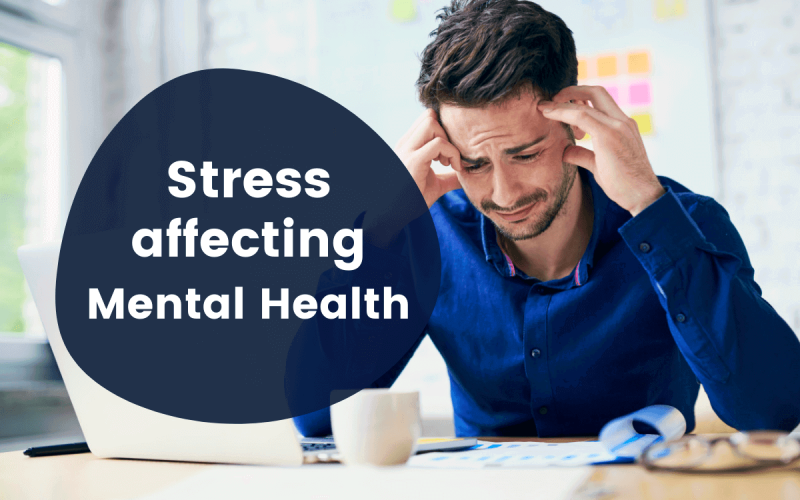Introduction
Stress is a normal part of life, but the effects of stress on mental health can be serious when it becomes chronic. From tight deadlines at work to family responsibilities, everyday challenges can trigger stress. Left unmanaged, stress can lead to anxiety, depression, and even physical illness. In this article, we’ll explore how stress and mental health are connected, examine the common signs of stress, and offer simple, science-backed strategies to cope. By understanding stress effects, you can take steps today to protect your mental well-being and build lasting resilience.
What Is Stress?
Stress is your body’s natural response to any demand or threat. When you face a stressor—like an exam, job interview, or traffic jam—your body releases hormones such as cortisol and adrenaline. These chemicals trigger the “fight-or-flight” response, sharpening your focus and boosting energy. While this reaction helps you handle short-term challenges, ongoing stress keeps these hormones elevated, which can harm your mind and body over time.
Acute vs. Chronic Stress
Stress falls into two main types:
- Acute Stress: Short bursts of worry or excitement, such as giving a speech or taking a test. Symptoms often fade once the event ends.
- Chronic Stress: Long-term stress that persists for weeks, months, or even years. Common sources include ongoing work pressure, financial problems, or caregiving duties.
While acute stress can sometimes motivate us, chronic stress is the real culprit behind many mental health concerns. Recognizing which type you face is the first step in managing stress effects.
How Stress Impacts Mental Health
The effects of stress on mental health are wide-ranging. Here are the most common ways stress can affect your mind:
1. Anxiety and Panic Attacks
Long-term stress keeps your body in high alert. Over time, this can lead to chronic anxiety—constant worry that interferes with daily life. In some cases, stress triggers panic attacks, sudden waves of intense fear that include heart palpitations, sweating, and shortness of breath.
2. Depression and Low Mood
When stress wears you down, it can disrupt brain chemistry and lower levels of feel-good neurotransmitters like serotonin. This imbalance may lead to depressive symptoms, such as persistent sadness, loss of interest in activities, and difficulty sleeping.
3. Cognitive Problems
High stress levels impair memory and concentration. You may experience “brain fog,” making it hard to focus on tasks or recall important details. This decline in cognitive function can further fuel anxiety and frustration.
4. Sleep Disturbances
Stress often leads to racing thoughts at bedtime, making it hard to fall or stay asleep. Poor sleep worsens mental health, creating a vicious cycle: the more stressed you feel, the less you sleep; the less you sleep, the more stressed you become.
5. Irritability and Mood Swings
Stress changes the balance of hormones and brain chemicals, which can make you more prone to irritability and sudden mood swings. You may find yourself snapping at loved ones over minor issues.
Physical Symptoms of Stress
Stress doesn’t just affect your mind; it takes a toll on your body, which in turn can worsen your mental state. Common physical stress effects include:
- Headaches and Migraines: Tension builds in the neck and shoulders, triggering pain.
- Muscle Tension: Chronic stress tightens muscles, leading to aches and stiffness.
- Digestive Issues: Stress can cause stomach aches, nausea, or changes in appetite.
- Weakened Immune System: Elevated cortisol weakens immunity, making you more prone to colds and infections.
- High Blood Pressure: Persistent stress can raise blood pressure, increasing the risk of heart disease.
By recognizing these signs, you can see how stress and mental health intertwine with physical health.
Who Is at Risk?
Anyone can experience stress, but certain factors increase vulnerability:
- High-Pressure Jobs: Roles with tight deadlines or high stakes.
- Major Life Changes: Events like moving, divorce, or job loss.
- Primary Caregivers: Looking after children, elderly relatives, or ill family members.
- People with Past Trauma: Individuals with a history of abuse or serious accidents.
- Lack of Support: Limited social networks or strained relationships.
If you fall into one of these groups, it’s even more crucial to adopt stress-management habits.
Coping Strategies for Stress and Mental Health
Managing stress effectively can protect your mental health. Here are simple, proven techniques:
1. Practice Mindful Breathing
Take slow, deep breaths: inhale for four counts, hold for two, exhale for six. Repeat for five minutes. This activates your parasympathetic nervous system, helping your body calm down.
2. Move Your Body
Physical activity—from walking to yoga—reduces cortisol levels and releases endorphins, natural mood lifters. Aim for at least 30 minutes of moderate exercise most days.
3. Build a Support Network
Talk to friends or family when you feel overwhelmed. Simply sharing your thoughts can lessen stress and remind you you’re not alone.
4. Set Realistic Goals
Break big tasks into small, manageable steps. Celebrate each achievement to boost confidence and reduce overwhelm.
5. Limit Stimulants
Too much caffeine or sugar can spike anxiety. Swap a coffee or soda for water, herbal tea, or a healthy snack like nuts or fruit.
6. Unplug and Recharge
Allocate tech-free time each day. Read a book, journal, or enjoy a hobby you love. This break from screens helps your brain rest.
7. Practice Gratitude
Each evening, write down three things you’re grateful for. Focusing on positive moments can lift mood and reduce stress.
Professional Help and Therapy
Sometimes self-help isn’t enough. If stress and mental health issues persist, consider professional support:
- Cognitive Behavioral Therapy (CBT): Helps you identify and change negative thought patterns.
- Mindfulness-Based Stress Reduction (MBSR): Uses meditation and gentle yoga to improve awareness and reduce anxiety.
- Medication: Antidepressants or anti-anxiety drugs may be prescribed for severe symptoms under a doctor’s guidance.
- Support Groups: Sharing experiences with peers can provide comfort and practical tips.
Seeking help is a sign of strength, not weakness. A therapist or counselor can guide you toward healthier coping strategies.
Stress Prevention: Building Long-Term Resilience
Preventing chronic stress is the best way to protect your mental health over time:
- Maintain a Balanced Lifestyle: Eat nutritious foods, stay active, and get 7–9 hours of sleep.
- Schedule “Me Time”: Regularly do activities that recharge you—reading, crafting, or spending time in nature.
- Learn Time Management: Use planners or apps to organize tasks and deadlines.
- Develop Emotional Awareness: Check in with your feelings daily. Name emotions like “frustrated” or “nervous” to reduce their power.
- Cultivate Optimism: Focus on solutions rather than problems. Practice reframing challenges as opportunities to learn.
By weaving these habits into your daily routine, you build a mental “stress shield” that helps you face life’s ups and downs more easily.
Conclusion
Stress is a natural reaction, but its effects on mental health can be serious when left unchecked. Chronic stress can lead to anxiety, depression, sleep problems, and physical illness. Thankfully, simple strategies—like mindful breathing, regular exercise, and building strong social ties—can help you manage stress and protect your well-being. If self-help isn’t enough, therapy and support groups offer additional guidance. By understanding stress and taking proactive steps, you can strengthen your resilience and enjoy a healthier, more balanced life. Start today: choose one stress-busting habit, practice it daily, and watch how your mind and body thank you.










